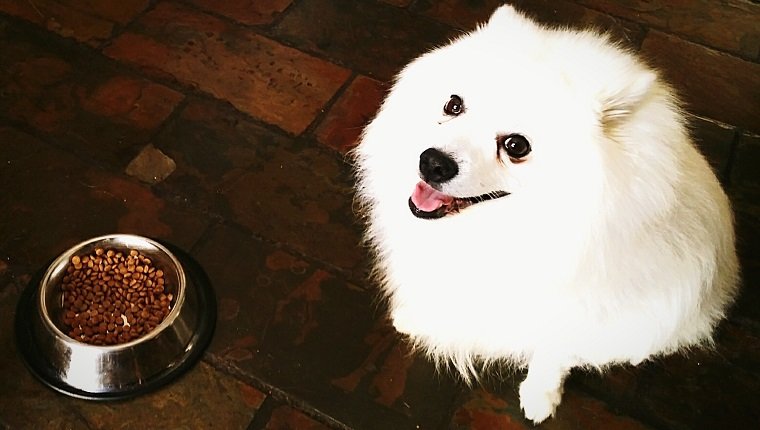One of our DogTime readers wants to know why her dog won’t eat when he can’t see his human. She writes:
Dear Labby,
My dog loves his food and is usually a great eater, but as soon as I leave the room, he goes on a hunger strike. Most days this isn’t a problem because I give him food while I’m eating breakfast or dinner, and he’ll just happily eat at the same time while I sit in the kitchen.
But sometimes my pup has to spend time at his grandma’s house while I’m out of town, or a pet sitter will have to feed him when I can’t be home in time for dinner. He’ll refuse to eat. Not only does it hurt his grandma’s feelings, but I’m sure he’s also going hungry.
Why won’t he eat if I’m not around? Can I do something to make him more comfortable eating without me? Is there something his pet sitter should do to make him eat? Please help!
Sincerely,
When Eating, Isolated Rover Denies Dinner Interest Every Time
Dear Labby Has The Answer!

Dear W.E.I.R.D. D.I.E.T.,
Most dogs love to eat, so it can be concerning when they decide to go on an unexpected diet for unknown reasons.
It’s especially troubling when you know that your dog is normally all too eager to gobble up food as fast as you can put it down. Why would your pup need you to be present for them to eat if they are given the same food in the same bowl that they always get?
Well, there are a few reasons your pup may refuse to eat when you’re not around, and you can do some things to help get them to feast while you’re far away.
Maybe He’s Missing You
One reason your pup may not be willing to eat without you is that he’s used to you being there during meal time. Dogs are social animals, and he may see eating as a social event where you share your time and bond.
This happens in the wild, too, when dogs learn to eat with their pack. It provides a sense of camaraderie and safety.
If this is the case, you should start trying to train your dog to feel comfortable eating when you’re not around.
Start by standing in the doorway of the room while he’s eating. Gradually back out of the room and out of sight for a few seconds at a time, then come back in. You may want to put a treat in your dog’s bowl when you come back to distract him.
Continue this process, staying out of the room for longer periods of time until your dog feels comfortable. It will take a while to train your dog this way, but keep at it until he’s comfortable eating a full meal while you’re out of sight.
Maybe He’s On Watchdog Duty

Another reason your dog may be uncomfortable eating without you is that he feels the need to protect the home while you’re gone, and that can be a source of stress.
Many dogs are territorial, and when you’re not around, all of the guard dog duty falls on them. They might feel a sense of imminent danger, and every odd noise, sight, or smell can put them on edge, making it difficult for them to let their guard down enough to eat.
One way to help your dog in this situation is to make the environment feel safer and more protected. Draw the curtains closed, turn off anything that makes noise such as televisions and radios, and make sure their environment is as free from exciting stimulation as possible.
You might also try a long walk or vigorous play session before you leave to relieve some of the nervous energy.
Maybe He’s Anxious

One of the most common reasons dogs don’t eat without their humans is separation anxiety. This basically means that your dog depends on your presence and doesn’t feel comfortable without you around.
Dogs experience separation anxiety individually, and it can manifest in different ways. Some dogs actually eat more, as chewing can sometimes be a form of stress relief. Other dogs only eat at certain times, and some refuse to eat at all until their humans have returned.
Separation anxiety is very tricky to deal with. There are a few things you can do to reduce separation anxiety, such as exercising to reduce anxious energy, giving your dog certain foods or supplements that encourage relaxation, or using medication in some cases.
Before you make decisions on how to handle your dog’s separation anxiety, you should consult your veterinarian or a professional behaviorist. Many dogs who suffer from separation anxiety take years to recover, and some don’t respond to any efforts to reduce symptoms at all.
But before you lose hope, talk to a professional and read up on techniques to reduce separation anxiety. Your dog may respond well to treatment and gradually become more comfortable when you’re not around.
Keep At It!
So, W.E.I.R.D. D.I.E.T., hopefully you can take steps to make sure your dog is happy to gobble his dinner when you’re not the one serving it. It may take some time, treatment, and training, but it will be worth the effort when grandma calls you to tell you what a good little eater your pooch is.
Let’s just hope you aren’t too successful, or your pup may just eat everything in sight!
Does your dog refuse to eat when you’re not around? What do you do to help them? Let us know in the comments below and leave your questions for Dear Labby!









